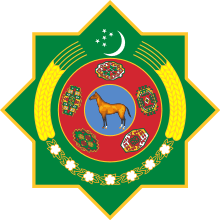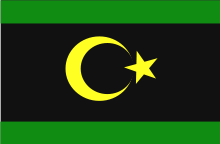Junaid Khan (de facto ruler of Khiva)
Junaid Khan (Muhammet-Kurban Serdar) (Turkmen: Jüneýit han; 1857 — 1938) - was a talented military commander[1] from the Turkmen yomud tribe who was the (last) de facto ruler of the State of Khorezm[2] from 1918 to 1920, Chief of the Armed forces (Serdar-Kerim) of Khorezm during the tumultuous years after the Russian October revolution.
Junaid Khan | |
|---|---|
| De facto (last) ruler of the State of Khorezm | |
| In office March 1918 – February 1920 | |
| Monarch | Sayid Abdullah |
| Personal details | |
| Born | 1857 or 1862 Badirkent, Dashoguz, Khanate of Khiva |
| Died | 1938 (aged 76 or 81) near Herat, Afghanistan |
| Nationality | Turkmen Yomut tribe |
| Father | Khojibay |
| Military service | |
| Years of service | 1912-1938 |
| Rank | General, Chief of the Armed forces |
Part of a series on the |
|---|
| History of Turkmenistan |
 |
| Periods |
|
Antiquity
|
|
Early modern history |
| Related historical names of the region |
|
|
| History of Uzbekistan |
|---|
|
|
|
Biography before 1917
Born in 1857 (according to other sources in 1862), Junaid Khan was the son of Khojibay, a powerful leader of the yomud (Turkmen) tribe[3] of Junaids and a wealthy man. Muhammet-Kurban himself, despite his illiteracy, also enjoyed relevant authority among his tribesmen, which allowed him to become first kazi (judge) in the village, then a water distributor (mirab).
Rise to power in Khiva

In September 1917, after the overthrow of the government of young (revolutionary) Khivans, who had advocated reform and wished to limit the power of the Khan of Khiva (Khorezm), Asfandiyar Khan, Muhammet-Kurban Serdar arrived to the capital. By uniting previously warring Turkmen tribes and establishing close relations with Colonel Ivan Zaitsev, the head of the detachment sent to Khiva by the Provisional Government of Russia, he became one of the most influential people in the Khanate.[5]
In January 1918, the ruler of Khiva, Asfandiyar Khan, appointed Muhammet-Kurban as the commander of the armed forces of the Khanate,[3] bestowing on him the title “Serdar-Karim” (“noble commander”). After Zaitsev’s detachment from Khiva recaptured Tashkent from Bolsheviks and Left Social Revolutionaries, the Junaid Khan's detachment, numbering about 1,600 horsemen, became the main military force in the Khanate.
Having defeated and expelled by mid-September 1918 his main adversaries in the khanate of Khiva - the Turkmen leaders of Koshmammet Khan, Gulam-ali, Shamyrat-Bakhshi - Muhammed-Kurban actually became the ruler of Khiva.[6]
Clashes with the Red Army
Junaid Khan waged numerous wars for several years with the emerging Soviet Turkestan and later with constituent republics of Soviet Central Asia for different reasons: to keep Khiva independent from Soviet rule, to recapture lost territories of the Khanate during the years as Russian protectorate, as well as to accumulate wealth. Though initially some of his battles were successful, he lost the most important ones and finally fled first to Persia and then to Afghanistan where he eventually died in 1938.
See also
- Yomuds
- Turkmens
- Asfandiyar Khan
- Khanate of Khiva
- Russian conquest of Central Asia
- The Great Game
- Khorezm People's Soviet Republic
- Soviet Turkestan
- Khorezm
Literature
- Abdullahanov D.M. Tarki Dunyo. - Tashkent: Uzbekistan, 2009.
References
- Rafis Abazov, "Historical Dictionary of Turkmenistan", pa. 27, The Spacecrow Press, Inc, 2005
- Shoshana Keller. "To Moscow, Not Mecca", Greenwood Publishing Group, 2001, p. 35
- Shoshana Keller. "To Moscow, Not Mecca", Greenwood Publishing Group, 2001, p. 34-35
- After the original flag on display in the museum of Khiva. Described by J. Renault and H. Calvarin, Franciae Vexilla # 5/51 (April 1997), cited after Ivan Sache on the Khiva page at Flags of the World (FOTW). According to David Straub (1996) on FOTW Archived 27 February 2011 at the Wayback Machine, "The flag of the Khivan Khanate in the pre-Soviet period is unknown."
- Rafis Abazov, "Historical Dictionary of Turkmenistan", The Spacecrow Press, Inc, 2005
- "History of Civilizations of Central Asia", Volume IV, p. 319
External links
- "Russian Invasion (the end of the XIX century)"
- "The dramatic end of Khiva"
- Map of the Khanates of Bukhara, Khiva, and Khokand and Part of Russian Turkistan from 1875 by Eugene Schuyler
Category:Khanate of Khiva Category:States and territories disestablished in 1920 Category:Central Asia in the Russian Empire Category:Lists of khans Category:Former Russian protectorates
Merged content from Draft:Junaid Khan to here. See Talk:merger discussion section.